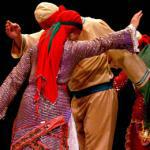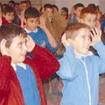"Alevites will not vote for those political parties who have been unwilling to face a series of problems which need to be solved in Turkey: poverty, corruption, freedom of expression, the right of people to express different identities, unemployment, health, education, the environment and global warming", said the Alevi organisations.
Call for democracy and Alevi rights
They added that they would support parties and independent candidates of the left who would:
* change the constitution put in place after the military coup of 12 September 1980 in order to have a laicist, democratic and civil constitution
* democratize the anti-democratic election law, change the 10 percent hurdle and the law on political parties
* recognise Alevitesm legally and constitutionally
* recognise the Alevi "Cem" houses as places of worship
* abolish the Department of Religious Affairs
* treat all beliefs equally, according to a liberal rather than an othering principle of laicism
* stop assimilation and abolish compulsory religious education classes
* abolish discriminatory practices towards Alevites and people of other faiths
* stop using the Haci Bektas Veli Lodge (in Central Anatolia) as a museum and return it to the Alevites as a place of worship
* turn the Madimak Hotel in Sivas, in which 35 Alevites burned to death after an arson attack in 1993, into a "Peace and Fraternity Museum"
Need for a strong party of the left
The Alevi organizations expressed their disappointment in political parties and their support for independent candidates. They also said that there was a need for a party of the left, which "would describe social accord in terms of justice, law, democracy and equal rights, which would support a culture of living together as equals, which would support the universal principle and culture of the left and of social democracy".
The AAB and AABK said that for such a party to evolve, there needed to be cooperation of leftist groups, parties, initiatives, democratic mass organisations, trade unions, professional associations, women's organisations, environmentalists and all those who felt marginalized in the current political climate. (TK/AG/EÜ)





